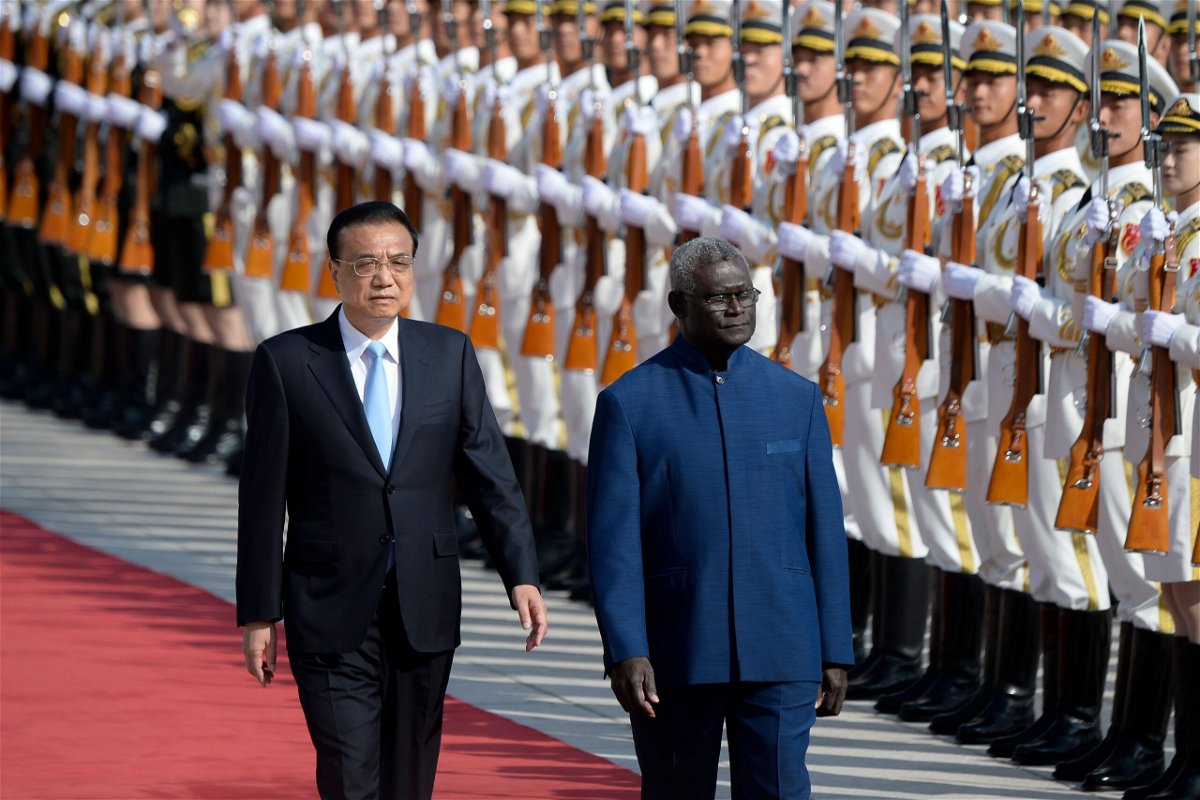Solomon Islands leader defends possible China security deal, calls backlash ‘very insulting’

Solomon Islands Prime Minister Manasseh Sogavare and Chinese Premier Li Keqiang at the Great Hall of the People in Beijing on October 9
By Hilary Whiteman, Caitlin McGee and Jessie Yeung, CNN
The Prime Minister of the Solomon Islands on Tuesday defended the country’s possible security deal with China, hitting back at critics and calling their protests “very insulting.”
The Pacific Island nation confirmed last week it would expand its security relationship with China — prompting alarm from regional leaders wary of Beijing’s growing reach.
“We find it very insulting to be branded as unfit to manage our sovereign affairs,” Prime Minister Manasseh Sogavare said in Parliament Tuesday, addressing the international backlash. “Our security approach is not done in a vacuum and not without due consideration to all our partners.”
“The Security Treaty is at the request of the Solomon Islands, and we have not been pressured … in any way by our new friends,” he added. “We have no intention, Mr Speaker, of pitching into any geopolitical power struggle.”
He also criticized Australian media over its reports that Beijing is allegedly planning to build a military base in the Solomon Islands — a potential first for China in the Pacific region regarded by Canberra as its backyard.
In a statement Friday, the Prime Minister’s office said the government was “working to sign off and implement a number of development frameworks with China to further create a secure and safe environment for local and foreign investments.”
Sogavare further defended this move Tuesday, telling Parliament, “In moving towards our security needs, we need to diversify … we are a country that has limited security capabilities and it is clear we will constantly need support.”
But the potential arrangement has sparked concern from several countries including the United States and Australia, which have become increasingly wary of the expanding footprint of an assertive China in the region.
For decades, Australia has enjoyed strong influence among the Pacific Islands as a wealthy donor assisting the aid-dependent nations. But in recent years, China has also become a major player in the region, investing billions of dollars — making these tiny islands the center of a heated power struggle.
These tensions have only risen as China ramped up its maritime capabilities and militarized islands in the South China Sea.
Australia has an existing security agreement with the Solomon Islands, active since 2018, which allows Australian police, defense and civilian personnel to deploy rapidly to the islands in the event of security threats.
The Solomon Islands government noted that agreement in its statement Friday, saying it will “continue to preserve its Security Agreement with Australia as it develops and deepen its relations with all partners including with China.”
Australia’s Defense Minister Peter Dutton voiced concern Friday that any security arrangement with Beijing could eventually lead to China expanding its military presence in the region — a stance reiterated Monday by Australian Prime Minister Scott Morrison.
The arrangement is “an issue of concern for the region,” Morrison told reporters — but added it did not come as a surprise. “We have been long aware of these pressures,” he said, adding the latest development served as “a reminder of the constant pressure and threats that present in our region to our own national security.”
New Zealand also voiced “strong condemnation” in a statement Tuesday, adding the possible partnership “risks destabilizing the current institutions and arrangements that have long ensured the Pacific region’s security.”
It also announced a continuation of New Zealand Defence Force (NZDF) and police deployments to the Solomon Islands following civil unrest in the Pacific island nation last year.
The Solomon Islands only recently established diplomatic relations with Beijing, with the government recognizing mainland China over Taiwan in 2019 — a decision over which the government has faced pressure from citizens.
That was one issue that came to bear during violent protests in the capital, Honiara, last November — when Australia deployed police and defense personnel to support local authorities.
During Sogavare’s Tuesday remarks, he said both New Zealand and Australia remain important bilateral partners, and that he had written a letter and text messages to Morrison on the topic.
Beijing’s Foreign Ministry spokesperson Wang Wenbin did not respond directly to a question on the pending security agreement Friday but said China and the Solomon Islands “conduct normal law enforcement and security cooperation on the basis of equality and mutual benefit.”
The-CNN-Wire
™ & © 2022 Cable News Network, Inc., a WarnerMedia Company. All rights reserved.
Additional reporting by CNN’s Simone McCarthy and Lizzy Yee.